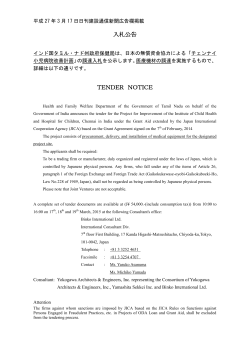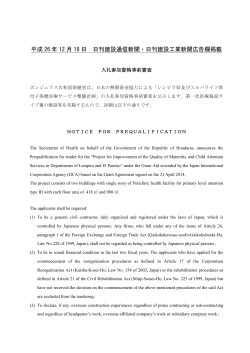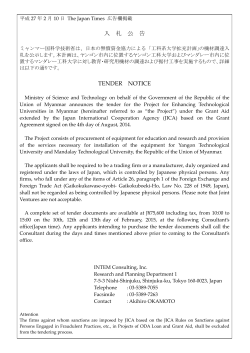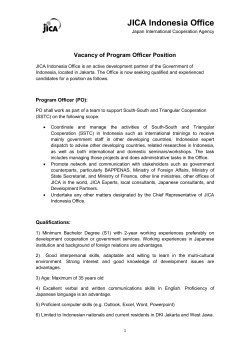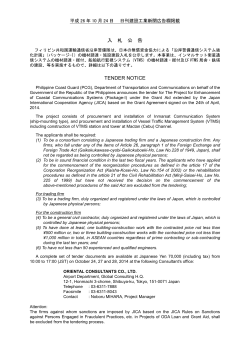
GROUP AND REGION-FOCUSED TRAINING
GROUP AND REGION-FOCUSED TRAINING GENERAL INFORMATION ON Promotion of Hydropower Development 課題別研修「水力開発の促進」 JFY 2015 NO. J15-04213 / ID. 1584592 Course Period in Japan: From May 19 to June 18, 2015 This information pertains to one of the Group and Region-Focused Training of the Japan International Cooperation Agency (JICA), which shall be implemented as part of the Official Development Assistance of the Government of Japan based on bilateral agreement between both Governments. I. Concept Background Hydropower plants are operable for a long time if properly planned and constructed, rightly operated and maintained since there has been little change in fundamental power generation system and equipment. Hydropower generation also draws much attention from the general public as the source of “clean”, environmentally friendly and renewable energy. It is conceivable also in developing countries that a steady hydropower development will be implemented from the viewpoint of effective use of domestic resources. However, their developed potential is insufficient at present compared with economically developable hydropower potential. Furthermore their engineers’ level in the hydropower engineering field is insufficient. Fostering of the engineers are important and also indispensable issues for future hydropower development. In addition, the entry into the electric business by the IPP is active in developing countries in recent years. It’s more and more important to utilize such IPP for the hydropower development from the view point of finance. For what? This program aims to offer the inclusive knowledge related to hydropower development to the participants. After that, the participants will expect to develop an action plan to familiarize the knowledge obtained in Japan to their home country / organization. For whom? This program is for those currently (or expected to be in the near future) posted to the managerial position in the government agencies or electric power utilities which are in charge of the hydropower development. How? This program gives priority to the opinion exchange within the participants as well as the site visits and lectures. Also, the participants will be able to have discussions with engineers who are well versed in the hydropower development technology in Japan. Concrete advice and guidance would be given to the participants in their preparation of final report. 2/35 II. Description 1. Title (J-No.): Promotion of Hydropower Development (J1504213) 2. Course Period in JAPAN May 19 to June 18, 2015 3. Target Regions or Countries Cambodia, Kyrgyz Republic, Laos, Lebanon, Malaysia, Malawi, Myanmar, Nepal, Nigeria, Pakistan, Papua New Guinea, Philippines, Rwanda, Tanzania, Viet Nam, Zambia 4. Eligible / Target Organization Governmental agencies or electric power utilities which is responsible for hydropower development. 5. Course Capacity (Upper limit of Participants) 16 participants 6. Language to be used in this program English 7. Program Objective To familiarize the inclusive knowledge related to hydropower development obtained in Japan to the home country / organization. 8. Overall Goal To prepare some policies or plans contributing to steady promotion of hydropower development. 3/35 9. Expected Module Output and Contents: This program consists of the following components. Details on each component are given below: (1) Preliminary Phase in a participant’s home country (April to May, 2015) Participating organizations make required preparation for the Program in the respective country. The output of this program is a Final Report (refer to ANNEX 4), and the theme of the Report should be previously discussed with a supervisor to make it feasible plan. Expected Module Output Activities Formulation and submission of Job Report (refer to ANNEX Job Report and Country 2) and Country Report(refer to ANNEX3), presentation Report is formulated material of Job Report. (2) Core Phase in Japan (May 19 to June 18, 2015) Participants dispatched by the organizations attend the Program implemented in Japan. Expected Module Output Subjects/Agendas Methodology (1) To recognize the issues ・Preparation of Job and Country Report Presentation related to hydropower by the end of preparatory phase development in the home ・Presentation of Job Report Presentation country / organization. (2) To understand about hydropower development procedures including schemes of IPP Project and CDM in the power sector, and consider these applicability to the home country. (3) To understand differences of required development hydropower ・Outline of Electric Power Industry in Japan ・ Implementation & Procedure of hydropower development ( case in Japan) ・Environmental impact assessment of hydropower projects ・ CDM application for hydropower projects ・Hydropower project Development by ODA Scheme ・Outline of IPP Scheme ・Economic analysis and evaluation for power system ・ Design, geological investigation, operation and maintenance of hydro-PP technology ・Optimum operation planning for dam (planning, design, financial ・Project evaluation of hydro-PP analysis, O&M, rehabilitation, ・Cost Allocation of Multipurpose Dam etc.) between the home ・Tours of hydro-PP etc. country and Japan. ・Dam simulator & grid analysis 4/35 Lecture Lecture Lecture Lecture Lecture Lecture Lecture Lecture Lecture Lecture Lecture Observation Lecture (4) Participants make an ・Drawing up action plan action plan on dissemination activities of skills and knowledge gained from the training program in Japan. Lecture Consultation ・Final Report presentation and discussion Presentation (3)Finalization Phase in a participant’s home country (June to October, 2015) Participating organizations produce final outputs by making use of results brought back by participants. This phase marks the end of the Program. Expected Module Output Activities (5) The Action plans made by the participants will be shared (After training) ・Implementation an action plan The Action plans will be ・Filling in a questionnaire sheet discussed and promoted in in their organizations. their organizations. 5/35 <Structure of the program> Concept of the Program Overall Goal: To prepare some policies or plans contributing to steady promotion of hydropower development. Program Objective: To familiarize the inclusive knowledge related to hydropower development obtained in Japan to the home country / organization. 《Output》 (1)To recognize the issues related to hydropower development in the home country / organization. (2)To understand about hydropower development procedures including schemes of IPP Project and CDM in the power sector, and consider these applicability to the home country. (3)To understand differences of required hydropower development technology (planning, design, financial analysis, O&M, rehabilitation, etc.) between the home country and Japan. (4)Participants make an action plan on dissemination activities of skills and knowledge gained from the training program in Japan. Flow of the Program (subject to minor changes) Presentation of Job Report (at the first stage of the program in Japan) All participants will present your Job Report already submitted to JICA. This is the starting point of the program in Japan for each participant. Job Report Presentation will be monitored by Japanese domain experts, and it’s very important to know other country’s hydropower development situation. So please listen carefully and discuss actively. Program in Japan Through lectures, site visits, practices, presentations and discussions, the participants will gain key ideas or suggestions to promote the hydropower development. Detail will be described in the schedule. Date of Guidance and Presentation Date 6/35 Japanese hosts/organizers Presentation of Job Report 25,26 May JICA, JEPIC, J-POWER Preparation of Final Report 5 June J-POWER Completion on Final Report 15 June J-POWER Presentation of Final Report 16 June JICA, JEPIC, J-POWER Presentation of Final Report(at the final stage of the program in Japan) Upon commented by Japanese professionals in the field, participants will be requested to make up “Final Report” (including your Action Plan) as outcome of this program. Participants are required to write a feasible and concrete Action Plan and make a presentation at the end of the program in Japan, using Microsoft Power Point. You will receive professional evaluation from the point of technical and economical feasibility. The Final Report needs to satisfy the following requirements: 1) Applicability of Hydropower Development Procedures lectured in Japan to Your Country in order to promote Your Country’s Hydropower Development 2) 3) Recognition of Differences of Technology related to Hydropower Plants (planning, design, financial analysis, O&M, rehabilitation, etc.) between Your Countries and Japan Action Plan to Disseminate Knowledge obtained in Japan (How to report in your organization, How to apply to your job, etc.) End 7/35 III. Conditions and Procedures for Application 1. Expectations for the Participating Organizations: (1) This program is designed primarily for organizations that intend to address specific issues or problems identified in their operation. Participating organizations are expected to use the project for those specific purposes. (2) This program is enriched with contents and facilitation schemes specially developed in collaboration with relevant prominent organizations in Japan. These special features enable the project to meet specific requirements of applying organizations and effectively facilitate them toward solutions for the issues and problems. (3) As this program is designed to facilitate organizations to come up with concrete solutions for their issues, participating organizations are expected to make due preparation before dispatching their participants to Japan by carrying out the activities of the Preliminary Phase described in sectionⅡ-9 . (4) Participating organizations are also expected to make the best use of the results achieved by their participants in Japan by carrying out the activities of the Finalization Phase described in sectionⅡ-9. 2. Nominee Qualifications: Applying Organizations are expected to select nominees who meet the following qualifications. (1) Essential Qualifications 1) Current Duties: be responsible for hydropower development and those currently (or expected to be in the near future) posted to the managerial position in the government agencies or electric power utilities which are in charged of the development of hydropower generation. 2) Experience in the relevant field: have a minimum of 5 yeas practical experience in the field of hydropower development. 3) Age: 30-50 years of age 4) Educational Background: be a graduate of university Preferable to mechanical, electrical and civil engineering majors. Lectures are covered various topics such as basic theories related to hydroelectric power generation based on mechanical, electrical and civil engineering and general matters in respect to national policies and plans. Participants are expected to have a will to learn comprehensive knowledge of both their specialized fields and outside of their fields. 5) Language: have a sufficient command of spoken and written English which is equal to TOEFL IBT 79-80 (CBT 213, PBT 550) or more (This course includes active participation in discussions and intensive policy proposal writing, thus requires high competence of English ability. Please attach an official certificate for English ability 8/35 such as TOEFL, TOEIC etc.) 6) Health: must be in good health, both physically and mentally, to participate in the Program in Japan. 7) Must not be serving any form of military service. 3. Required Documents for Application (1) Application Form: The Application Form is available at the JICA office (or the Embassy of Japan). *Pregnancy Pregnant participants are strictly requested to attach the following documents in order to minimize the risk for their health. 1. letter of the participant’s consent to bear economic and physical risks 2. letter of consent from the participant’s supervisor 3. doctor’s letter with permission of her training participation. Please ask JICA Staff for the details. (2) Photocopy of passport: to be submitted with the application form, if you possess your passport which you will carry when entering Japan for this program. If not, you are requested to submit its photocopy as soon as you obtain it. *Photocopy should include the followings: Name, Date of birth, Nationality, Sex, Passport number and Expire date. (3) Nominee’s English Score Sheet: to be submitted with the application form. If you have any official documentation of English ability. (e.g., TOEFL, TOEIC, IELTS) (4) Job Report (detailed in “ANNEX 2”): to be submitted with the application form. Job Report information is detailed in the ANNEX 2. At the start of the training in Japan, participants are requested to do presentation based on their own Job Report (ANNEX 2). Each presentation time will be 20 minutes. Please send presentation data by using Microsoft Power Point. Equipment for visual aids (e.g. Multi-system video player, slide projector, Power Point XP) is available at JICA training center. 4. Procedures for Application and Selection: (1) Submission of the Application Documents: Closing date for applications: Please inquire to the JICA office (or the Embassy of Japan). (After receiving applications, the JICA office (or the Embassy of Japan) will send them to the JICA Center in JAPAN by March 19, 2015) (2) Selection: After receiving the documents through proper channels from your government, the JICA office (or the embassy of Japan) will conduct screenings, and then forward the 9/35 documents to the JICA Center in Japan. Selection will be made by the JICA Center in consultation with concerned organizations in Japan. The applying organization with the best intention to utilize the opportunity of this program will be highly valued in the selection. (3) Notice of Acceptance Notification of results will be made by the JICA office (or the Embassy of Japan) not later than April 20, 2015. 5. Document(s) to be submitted by accepted candidates: Before coming to Japan, only accepted participants are requested to send 3 documents which mentioned below. Those documents should be sent to JICA by May 7, 2015, by e-mail to tictip@jica.go.jp. (The maximum data size of each e-mail message is 3MB.) (1) Presentation data based on the Job Report (detailed in “ANNEX 2”) If the Job Report, which was submitted on the application procedure, was changed, the revised Job Report should be submitted. (2) Country Report (detailed in “ANNEX 3”) Country Report information is provided in the ANNEX 3. Country Report is important for each participant and Japanese experts to recognize the current situation of each country. (3) Either Annual Report or Statistics, or both (if possible) If participants’ organization or electric power sector makes annual reports or statistics or both, the latest ones should be submitted. 6. Conditions for Attendance: (1) to strictly adhere to the program schedule. (2) not to change the program topics. (3) not to extend the period of stay in Japan. (4) not to be accompanied by family members during the program. (5) to return to home countries at the end of the program in accordance with the travel schedule designated by JICA. (6) to refrain from engaging in any political activities, or any form of employment for profit or gain. (7) to observe Japanese laws and ordinances. If there is any violation of said laws and ordinances, participants may be required to return part or all of the training expenditure depending on the severity of said violation. (8) to observe the rules and regulations of the accommodation and not to change the accommodation designated by JICA. 10/35 IV. Administrative Arrangements 1. Organizer: (1) Name: Industrial Development and Public Policy Division, JICA TOKYO (2) Contact: tictip@jica.go.jp 2. Implementing Partner: (1) Name: JAPAN ELECTRIC POWER INFORMATION CENTER (2) URL: http://www.jepic.or.jp/en/index.html 3. Travel to Japan: (1) Air Ticket: The cost of a round-trip ticket between an international airport designated by JICA and Japan will be borne by JICA. (2) Travel Insurance: Coverage is from time of arrival up to departure in Japan. Thus traveling time outside Japan will not be covered. 4. Accommodation in Japan: JICA will arrange the following accommodations for the participants in Japan: JICA Tokyo International Center (JICA TOKYO) Address: 2-49-5 Nishihara, Shibuya-ku, Tokyo 151-0066, Japan TEL: 81-3-3485-7051 FAX: 81-3-3485-7904 (where “81” is the country code for Japan, and “3” is the local area code) If there is no vacancy at JICA TOKYO, JICA will arrange alternative accommodations for the participants. Please refer to facility guide of JICA TOKYO at its URL, http://www.jica.go.jp/english/contact/pdf/tic.pdf 5. Expenses: The following expenses will be provided for the participants by JICA: (1) Allowances for accommodation, meals, living expenses, outfit, and shipping (2) Expenses for study tours (basically in the form of train tickets.) (3) Free medical care for participants who become ill after arriving in Japan (costs related to pre-existing illness, pregnancy, or dental treatment are not included) (4) Expenses for program implementation, including materials For more details, please see “III. ALLOWANCES” of the brochure for participants titled “KENSHU-IN GUIDE BOOK,” which will be given before departure for Japan. 6. Pre-departure Orientation: A pre-departure orientation will be held at the respective country’s JICA office (or Japanese Embassy), to provide participants with details on travel to Japan, conditions of the workshop, and other matters. 11/35 ANNEX 1 'Schedule for JICA Training 2015(Tentative) Date Day 5/19 Tue 5/20 Wed Time Title Arrival in Japan AM Briefing Session PM Program Orientation by JICA & JEPIC PM Development of Hydropower Station by Japanese ODA AM Opening Ceremony, Program Orientation PM Outline of Electric Power Industry in Japan (G) AM Visit: Electrical Power Historical Museum (G) PM Visit: Manufacturer of Generating Equipment (E&M) 5/21 Thu 5/22 Fri 5/23 Sat Holiday 5/24 Sun Holiday 5/25 Mon 5/26 Tue 5/27 5/28 5/29 Wed Thu Fri AM J-POWER and Electric Power Industry in Japan (G) PM Job Report Presentation All Day Job Report Presentation AM Implementation and Procedure of Hydropower Development(case in Japan) (G) PM Environmental Impact Assessment PM Optimum Operation Planning for Dam Control (C) AM Geological Investigation & Evaluation for Hydropower Projects (C) PM Design Criteria of Hydropower Structures (C) AM Design of Electrical & Mechanical Equipment of Hydroelectric Power Plant (E&M) PM Operation & Maintenance of Hydropower Facilities(Civil) (C) PM Observation of Central Load Dispatching Center (E&(G)) PM Operation & Maintenance of Hydropower Facilities(Electricity) (E) 5/30 Sat Holiday 5/31 Sun Holiday (G) Visit: Chigasaki Research Institute (E&M&C) Visit: Power System Engineering Lab. (E&M&C) 6/1 Mon All Day Visit: Environmental Management in Hydropower Station (C) Visit: Dam simulator, Facility Tour in Chigasaki Reserche Institute(C) 12/35 Date Day 6/2 Tue 6/3 Wed 6/4 Thu Time Title AM Move to Place of Tours PM Site Visit: Pumped Storage Power Plant AM Site Visit: Hydropower Plant (E&M&C) PM Move to Tokyo AM Benefit of Hydropower Plant in System Operation (E) PM Design for Transmission Line (E) AM Cost Allocation of Multipurpose Dam (C) PM Discussion about and Preparation for Final Report (Presentation of Interim Report) (E&M&C) 6/5 Fri 6/6 Sat Holiday 6/7 Sun Holiday 6/8 Mon All Day Move to Place of Tours 6/9 Tue All Day Site Visit: Seawater Pumped Storage Plant (E&M&C) 6/10 Wed 6/11 Thu AM Site Visit: Thermal Power Station (E&M&C) PM Move toTokyo AM Outline of PM CDM Application for Hydropower Project (G) PM IPP Scheme (G) Economic analysis & evaluation for power system using computer simulation software (G) AM Project Evaluation of Hydropower Project (G) PM Discussion about and Preparation for Final Report 6/12 Fri 6/13 Sat Holiday 6/14 Sun Holiday 6/15 Mon All Day Discussion about and Preparation for Final Report 6/16 Tue All Day 6/17 Wed 6/18 Thu Presentation of Final Report Certification & Farewell Party AM Program Evaluation Session AM Closing Ceremony Departure for Home Country *Subject related to: M: Mechanical engineering E: Electrical engineering C: Civil Engineering G: General topics or all fields related 13/35 ANNEX 2 Job Report The participant is obligated to prepare the Job Report including contents as shown in Annex 2 in Preliminary Phase in its home country, and to make a presentation about it within about 20 minutes (using Power Points to be prepared in the home country) at the beginning of Core Phase in Japan. <Example of Job Report> 14/35 15/35 16/35 17/35 End 18/35 ANNEX 3 Country Report The participant is obligated to prepare the Country Report including contents as shown in Annex 3 in Preliminary Phase in its home country. Please attach related annual reports or statistics with the Country Report (if any). 1. Power Supply System Explain power supply system in your country briefly in the box below, then describe outlines and responsibilities of organizations concerned (including governmental authorities and private companies), in the table below. When you attach the relevant documents with the Country Report, you don’t need describe it. Instead, describe titles of the reference documents and pages clearly in the box. Describe outline and responsibility of each organization related to power industry in your country. Name of Organization 1. 2. 3. 4. 5. 6. 7. : 19/35 To add columns when necessary. Outline and Responsibility 2. Outline of Power Demand and Supply Explain situation on power demand and supply in your country briefly in the box below. When you attach the relevant documents with the Country Report, you don’t need describe it. Instead, describe titles of the reference documents and pages clearly in the box. 20/35 3. Electric Power System Illustrate location maps of power plants and transmission lines in your country in the box below. Note: when you can attach the relevant documents, you don’t need describe them. Instead, describe titles of the reference documents and pages clearly in the box. ・Current Electric Power System in ( [Legend] Thermal Power Plants (Existing): Hydroelectric Plants (Existing): Transmission Lines (Existing): Substations (Existing): 21/35 ) 4. Existing Generating Facilities Fill out blanks in the table below. Note: when you attach the relevant documents with the Country Report, you don’t need full them out. Instead, describe titles of the reference documents and pages clearly. Type Name Plant 1. 2. 3. 4. 5. 6. 7. 8. 9. 10. 11. 12. 13. To add columns when necessary. 22/35 of Power Location (Province) Installed Annual Power Output Generation (MW) (GWh) Power Commencement Operation Date Owner (Name of Power Utility) Electric 5. Electricity Tariff (Retail, Export and Import Energy, Purchased Energy from IPP) Explain current electricity tariff in your country briefly in the box below, which includes retail one for energy, import and export energy among your country and neighboring and purchased energy from IPPs (if any). Note: When you attach the relevant documents with the Country Report, you don’t need describe it. Instead, describe titles of the reference documents and pages clearly in the box. (1) Tariff for Retail Energy (2) Tariff for Imported Energy (3) Tariff for Exported Energy (4) Tariff for Energy purchased from IPPs 23/35 6. Governmental Energy Policy Note: When you attach the relevant documents with the Country Report, you don’t need describe it. Instead, describe titles of the reference documents and pages clearly in the box. 7. Governmental Power Sector Strategy Note: When you attach the relevant documents with the Country Report, you don’t need describe it. Instead, describe titles of the reference documents and pages clearly in the box. 24/35 8. Governmental Laws, Degrees and Regulations related to Hydropower Development Name Related Authority Regulated Items 1. 2. 3. 4. 5. To add columns when necessary 9. Power Development Plan When you attach the relevant documents with the Country Report, you don’t need describe it. Instead, describe titles of the reference documents and pages clearly in the box. 25/35 (1) Scheduled Hydropower Plant Fill out blanks in the table below. Note: “Development Stage” in the tables below means (1) Planning (conceptual design) stage, (2) Detail design stage, or (3) Construction stage. When you attach the relevant documents with the Country Report, you don’t need full them out. Instead, describe titles of the reference documents and pages clearly. Location Name (Province) 1. 2. 3. 4. 5. 6. 7. 8. 9. 10 To add columns when necessary. 26/35 Scheduled Commencement Power Output Annual Operation Date (MW) Energy (GWh) Power Development Stage Developer / Engineer (2) Scheduled Electric Power System in ( [Legend] Hydroelectric Plants (Existing): Thermal Power Plants (Existing): Transmission Lines (Existing): Substations (Existing): Hydroelectric Plants (Scheduled): Thermal Power Plants (Scheduled): Transmission Lines (Scheduled): Substations (Scheduled): 27/35 ) 10. Progress of Hydropower Development Describe current progress of hydropower development/projects (including CDM projects) in your countries briefly. When you attach the relevant documents with the Country Report, you don’t need describe it. Instead, describe titles of the reference documents and pages clearly. Reference: Renewable Energy Development Explain governmental policy, plan and current situations related to renewable energy development (ex. solar power, solar thermal power, wind power, bio thermal power, biomass, etc.) in your country briefly When you attach the relevant documents with the Country Report, you don’t need describe them. Instead, describe titles of the reference documents and pages clearly. End 28/35 ANNEX4 Final Report A participant is required to make Final Report for the presentation of it at the final stage of the program in Japan. Final Report should include the following contents. <Example of Final Report> 29/35 30/35 31/35 32/35 End 33/35 For Your Reference JICA and Capacity Development The key concept underpinning JICA operations since its establishment in 1974 has been the conviction that “capacity development” is central to the socioeconomic development of any country, regardless of the specific operational scheme one may be undertaking, i.e. expert assignments, development projects, development study projects, training programs, JOCV programs, etc. Within this wide range of programs, Training Programs have long occupied an important place in JICA operations. Conducted in Japan, they provide partner countries with opportunities to acquire practical knowledge accumulated in Japanese society. Participants dispatched by partner countries might find useful knowledge and re-create their own knowledge for enhancement of their own capacity or that of the organization and society to which they belong. About 460 pre-organized programs cover a wide range of professional fields, ranging from education, health, infrastructure, energy, trade and finance, to agriculture, rural development, gender mainstreaming, and environmental protection. A variety of programs and are being customized to address the specific needs of different target organizations, such as policy-making organizations, service provision organizations, as well as research and academic institutions. Some programs are organized to target a certain group of countries with similar developmental challenges. Japanese Development Experience Japan was the first non-Western country to successfully modernize its society and industrialize its economy. At the core of this process, which started more than 140 years ago, was the “adopt and adapt” concept by which a wide range of appropriate skills and knowledge have been imported from developed countries; these skills and knowledge have been adapted and/or improved using local skills, knowledge and initiatives. They finally became internalized in Japanese society to suit its local needs and conditions. From engineering technology to production management methods, most of the know-how that has enabled Japan to become what it is today has emanated from this “adoption and adaptation” process, which, of course, has been accompanied by countless failures and errors behind the success stories. We presume that such experiences, both successful and unsuccessful, will be useful to our partners who are trying to address the challenges currently faced by developing countries. However, it is rather challenging to share with our partners this whole body of Japan’s developmental experience. This difficulty has to do, in part, with the challenge of explaining a body of “tacit knowledge,” a type of knowledge that cannot fully be expressed in words or numbers. Adding to this difficulty are the social and cultural systems of Japan that vastly differ from those of other Western industrialized countries, and hence still remain unfamiliar to many partner countries. Simply stated, coming to Japan might be one way of overcoming such a cultural gap. JICA, therefore, would like to invite as many leaders of partner countries as possible to come and visit us, to mingle with the Japanese people, and witness the advantages as well as the disadvantages of Japanese systems, so that integration of their findings might help them reach their developmental objectives. 34/35 CORRESPONDENCE For enquiries and further information, please contact the JICA office or the Embassy of Japan. Further, address correspondence to: JICA Tokyo International Center (JICA TOKYO) Address: 2-49-5 Nishihara, Shibuya-ku, Tokyo 151-0066, Japan TEL: +81-3-3485-7051 FAX: +81-3-3485-7904 35/35
© Copyright 2025
